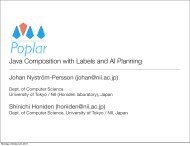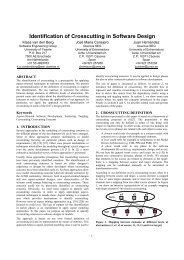Towards Using Constructive Type Theory for VerifiableModular TransformationsSteffen ZschalerKing’s College London,Department of Informatics,London, UKszschaler@acm.orgIman PoernomoKing’s College London,Department of Informatics,London, UKiman.poernomo@kcl.ac.ukJeffrey TerrellKing’s College London,Department of Informatics,London, UKjeffrey.terrell@kcl.ac.ukABSTRACTModel transformations have been studied for some time, typic<strong>all</strong>yusing a semantics based on graph transformations. This has beenvery successful in defining, optimising and executing model transformations,but has been less useful for providing a firm semanticbasis for modular, reusable transformations. We propose a novelrendering of transformation semantics in terms of constructive typetheory and show how this can be employed for expressing dependenciesand guarantees of transformation modules in a formal framework.Categories and Subject DescriptorsD2.3 [Software Engineering]: Coding Tools and TechniquesKeywordsProofs-as-model-transformations, type theory, formal model drivenengineering1. INTRODUCTIONModel-Driven Engineering (MDE) focuses on using models asthe central artefact of software development, and model transformationsto turn them into executable code. Model transformationscan encode design rules, platform choices, or even coding conventions.MDE can result in better software quality because it encouragesdevelopers to focus on high-level, domain-centered concepts,which ensures consistency of implementation and reliabilityof analysis.As MDE is being used increasingly within science and industry,and transformations of interest are becoming more complex, thetrustworthiness of transformations is quite rightly receiving moreattention. The informality of MDE as it currently stands makes ituntrustworthy and therefore potenti<strong>all</strong>y dangerous. If model transformationsare incorrect, the MDE process can result in software ofa lower quality than that produced by traditional software development.A sm<strong>all</strong> number of errors in a complex transformation caneasily lead to an exponential number of errors in the resulting code,which may be difficult to trace and debug.Previous work by Terrell and Poernomo [14] has attempted tosolve this problem within a formal method known as ConstructiveType Theory (CTT). CTT possesses a property known as the Curry-Howard Isomorphism, where data, functions and their correctnessproofs can be treated as ontologic<strong>all</strong>y equivalent, and where a similarequivalence holds for the related trinity of typing information,program specifications and programs. A practical implication ofthe isomorphism is that, by proving the logical validity of a modeltransformation specification, we can automatic<strong>all</strong>y synthesize animplementation of the transformation that satisfies the specification.Following [13], we c<strong>all</strong> this the proofs-as-model-transformationsparadigm.As transformations become more complex, there is an increasingneed to be able to modularise them. Some work on this hasalready been done [1, 3, 4, 6–8, 11, 12, 17, 19, 20]. However, it isstill difficult to safely reuse transformation modules as there arecurrently no techniques for expressing or verifying a transformationmodule’s dependencies. In [14], Terrell and Poernomo showedhow proofs-as-model-transformations <strong>all</strong>ows us to develop a structuredapproach to provably correct model transformations, definingmaps between class hierarchies. In this paper, we sketch how thisapproach can be extended to form<strong>all</strong>y express contracts for transformationmodules. In particular, we show how the higher-ordernature of CTT can enable a natural characterisation of a transformationmodule’s dependencies.2. SPECIFICATION AND DEVELOPMENTOF MODEL TRANSFORMATIONSConstructive Type Theory (CTT) as a formal method is like aconventional functional programming type system that has beenextended to include logical specifications, so that a valid type inferenceis also a proof of program certification. For example, justas we can find terms 2 and + that satisfy2:int or +:int ∗ int → intas valid type inferences in a typical functional programming language,we can also develop a term t in CTT such thatt : ∀x : int.∃y : int.GreaterP rimeNumber(x, y) (1)Any such term t is simultaneously• a program that, given an input x, will output a prime numbery greater than x satisfying GreaterP rimeNumber(x, y);• a proof that the program meets its specification.That is, t is proof-carrying code, a program and a certification ofthe program’s correctness with respect to its specification (1).We have applied the same principle to model transformations,extending the type system to accommodate EMOF like metamodelsas types so that we can develop certified model transformations tby developing a type inference of the formt : ∀x : Source.Pre(x) →∃y : Target.Post(x, y)Any such term t is simultaneously• a model transformation that, given an input model x of metamodelSource, will output a model y of metamodel Target;
• a proof that the model transformation meets its specification.In the next section, we present a brief summary of how CTT canbe used to specify and develop model transformations.2.1 Constructive Type TheoryWe sketch our version of constructive type theory (a sugared versionof Coquand and Huet’s Extended Calculus of Constructions,the type theory at the heart of the Coq theorem prover).The CTT is a lambda calculus whose core set of terms, P , aregiven over a set of variables, V :P ::= V |λ V.P|(P P)|P, P|fst(P )|snd(P )|inl(P )|inr(P )|match P with inl(V ) ⇒ P | inr(V ) ⇒ PThe lambda calculus is a functional programming language. Wecan compile terms and run them as programs. As such, the calculusis equipped with an evaluation semantics. Lambda abstraction andapplication are standard and widely used in functional programminglanguages such as SML. The term λx.Pdefines a functionthat takes x as input and will output P [a/x] when applied to a viaan application (λ x.P)a. The calculus also includes pairs a, b,where fst(a, b) will evaluate to the first projection a (similarlyfor the second projection). Case matching provides a form of conditional,so that match z with inl(x) ⇒ P | inr(y) ⇒ Q willevaluate to P [x/a] if z is inl(a) and to Q[y/a] if z is inr(a). Evaluationis assumed to be lazy – that is, the operational semantics isapplied to the outermost terms first, working inwards until a neutralterm is reached. We write a ✄ b if a evaluates to b according to thissemantics.Like most modern programming languages, the CTT calculus istyped, <strong>all</strong>owing us to specify, for example, the input and outputtypes of lambda terms. We writef : Tto signify that a term f has type T .The terms of our lambda calculus are associated with the followingkinds of types: basic types, e.g. integers, functional types(A → B), product types (A ∗ B), disjoint unions (A|B), dependentproduct types (Πx : t.a) and dependent sum types (Σx : t.b),where in both cases x is taken from V . The first three types havethe standard meaning found in typical functional programming languages.For example,t :(A → B)means that t is a function that can accept as input any value of typeA to produce a value of type B.The next two types require some explanation. A dependent producttype expresses the dependence of a function’s output types onits input term arguments. For example, if(λx.t) :Πx : T.F(x)then the function (λx.t) can input any value a of type T , producingan output value t[a/x] of type F (a). Thus, the final output type ofthe function is parameterized by the input value.Similarly, the dependent sum type expresses a dependence betweenthe type of a pair’s second element and the value of its firstelement. For example, if we have a pair(a, b) :Σx : T.F(x)then the type of b is F (a).Typing rules provide a formal system for determining what thetypes of lambda terms should be.We have extended the standard way of encoding objects andclasses, using record types of the same form as found in functionalprogramming languages such as SML. Bidirectional and cyclic dependenciespose a technical problem to CTT. We solve this by usingco-inductive record types. Co-induction over record types essenti<strong>all</strong>y<strong>all</strong>ows us to expand as many references to other recordsas we require, simulating navigation through a metamodel’s cyclicreference structure. The formal treatment of these concepts is givenin [14].2.2 Proofs as Model TransformationsThe Curry-Howard isomorphism shows that constructive logicis natur<strong>all</strong>y embedded within our type theory, where proofs correspondto terms, formulae to types, logical rules to typing rules,and proof normalization to term simplification. Consider the setof well-formed formulae WFF, built from exactly the same predicatesthat occur in our type theory. We can define an injectionasType from WFF to types of the lambda calculus as in Fig. 1.AasType(A)Q(x), where Q is a predicateQ(x)∀x : T.Px : T.asType(P )∃x : T.P Σx : T.asType(P )P ∧ QasType(P ) ∗ asType(Q)P ∨ QasType(P )|asType(Q)P ⇒ QasType(P ) → asType(Q)⊥⊥Figure 1: Definition of asType, an injection from WFF totypes of the lambda calculus.The isomorphism tells us that logical statements and proofs correspondto types and terms. We assume we have a proof inferencesystem for constructive logic Int (similar to the inference systemstaught in undergraduate logic classes, where Γ Int P means thata proposition P can be logic<strong>all</strong>y deduced from a set of assumptionsΓ).Theorem 1 Let Γ={G 1,...,G n} be a set of premises. Let Γ ={x 1 : G 1,...,x n : G n} be a corresponding set of typed variables.Let A be a well-formed formula. Then the following is true. Givena proof in constructive logic of Γ Int A we can use the typingrules to construct a well-typed proof-term p : asType(A) whosefree proof-term variables are Γ . Symmetric<strong>all</strong>y, given a well-typedproof-term p : asType(A) whose free term variables are Γ , we canconstruct a proof in constructive logic Γ A.✷Because the isomorphism holds, we will often omit the use ofasType and use logical connectives and quantifiers instead of theircomputational counterparts (and vice versa) where there is ambiguity(for example, we will write ∀ instead of Π if the context makesit clear that a dependent product is being employed).The key implication of this theorem is that• types can be considered to be specifications of functionalprograms and• an inhabitant of a specification type can be considered to beboth a program that satisfies the specification and a proof ofthis satisfaction.These results are entailed by the following.Theorem 2 Let Γ={G 1,...,G n} be a set of premises. Let Γ ={x 1 : G 1,...,x n : G n} be a corresponding set of typed variables.Let ∀x : T.∃y : U.P (x, y) be a well-formed ∀∃ formula.




